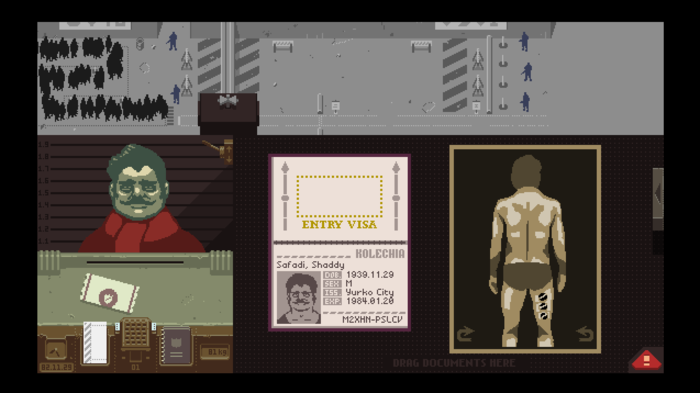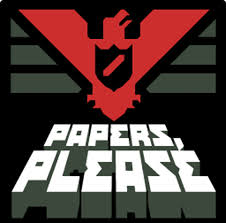Papers, Please
Is that a knife strapped to your leg, or are you happy to see me?

It’s difficult to say what is so gripping about "Papers, Please." The game isn’t especially fun in the traditional sense, but there’s something to it that keeps pulling you back, some sense of needing to improve performance or something about letting the right people into your country while keeping the wrong ones out. It’s best described as a puzzle game, and the game’s trailer calls it a "Dystopian Document Thriller" if that gives you a sense of where this is heading.
“Papers, Please” is a one man project, a work that Lucas Pope expanded from a Ludum Dare entry (there is even an immigrant named Dari Ludum early in the game). All programming was done with open source software, and all of the game’s sound effects were sourced through Freesound, a database of Creative Commons Licensed materials. The art style is simplistic, something you may have expected to see in the late Atari or early NES era but also a style that harkens to the game’s 1982 setting. If anything, the game’s writing sets the game above similar titles; the dialogue exchanges providing alternate senses of expectation and despair.
The game itself centers around an immigration checkpoint inspector for the fictional nation of Arstotzka. Arstotzka has sequestered itself behind closed borders for six years and finally decided to open its borders to a very limited degree. Opening cutscenes tell of how you obtained your position through the previous month’s Labor Lottery, a device instituted by Arstotzka seemingly to deal with massive unemployment. Upon being hired by the state, you and your family are relocated to government housing, referred to as a Class 8 dwelling, the conditions of which appear to be substandard. As you progress through the game, you not only have to keep your family fed and heated, but you also have to abide by immigration laws and regulations beneath the government’s watchful eye. More on that later.
The first day is easy: Only allow entry to Arstotzkan citizens. If a passport shows Arstotzka on it, you give it the “APPROVED” stamp. Anything else gets the “DENIED” stamp, and the immigrant is turned away. Hours pass, the day ends, and you collect your money to go home and sleep. The second day begins with a newspaper saying that Arstotzka has decided to open its borders. A notice from the Ministry of Admissions confirms this, and your guidelines change. Now any native or foreigner is admitted as long as they have a valid passport. This requires more scrutiny as people will try to enter with expired papers or those of another person. At the end of the second day, someone climbs over the wall and throws a hand grenade at the guard waiting on the Arstotzkan side. The guard shoots the terrorist but dies in the subsequent explosion. Restrictions get tighter.
And the restrictions keep getting tighter. By the third day, immigrants require an entry ticket. Soon that isn’t good enough, and they need more detailed paperwork, reasons for entering, duration of their stay, work passes, proof of polio vaccinations, and so on. Your job as inspector is to make sure that the paperwork confirms itself and the word of the person waiting to get inside. Each person you correctly process awards you a 5 credit payment from the government. The stricter the system becomes, the longer it takes to process each person, and you’ll soon find yourself frantic over the loss of income. Arstotzka allows you two incorrectly handled immigrants each day, and fines you for each one after those two.
Meanwhile, your unemployed family is depending on that income. You move into your humble apartment with your wife, son, mother-in-law, and uncle. They all require food and heat, and that comes out of your paycheck. Rent is removed automatically each day, and you have to make do with the remains. On my first playthrough, I had to alternate keeping them fed one day and heated the next just to try to keep them healthy enough to avoid the need for medicine. My wife still became violently ill, and I had to deny the family food for the day to cover the cost of medicine. Then the uncle became ill, and that cycle quickly spiraled down the drain. I got word that my sister was incarcerated, and I was given the option to adopt my niece. I couldn’t afford the fee and received a notice several days later telling me that she had gone missing. “Papers, Please” keeps you anxious. You’re struggling to make ends meet at home, and the longer the restrictions become, the less money you make.
The game will periodically offer you upgrades to your booth to make the inspection process easier, but these upgrades must be paid for out of your pocket. The government certainly won’t give you more credits for improvements. If you want improvement, you work harder.
Moral decisions are spread throughout the game. Early on, you’re approached by an immigrant with valid papers who tells you to look after his wife, who will be next in line. You admit the man to Arstotzka, and the wife approaches. She doesn’t have her paperwork in order. Do you follow the rules and turn her away, or do you let her in and face a government citation? This is an especially harsh decision when new to the game. If you already have your two free citations for the day, admitting her will see a 5-credit fine printed for you. Is keeping this husband and wife together worth your family not eating for the day? Do you detain the man who kills children so the state can handle him, or do you let him through at the request of a victim’s father seeking vengeance? Can you accept the bribe of the man wanting to enter so he can sell drugs in your streets? Do you remain loyal to Arstotzka, or do you aid a revolutionary organization out of spite for the nation whose regulations have pushed your back to the wall?
“Papers, Please” spans 31 days and has 20 different endings, most of which end with you either dying or tossed in prison, sometimes alone, sometimes joined by your family. A typical playthrough takes several hours, but there is a lot of replayability. If you get the 20th ending (the only one that sees you still employed), you’ll unlock Endless Mode, which has different challenges situated at optional points of difficulty throughout the game.
This game is hard to rate. I was really into it, but if this kind of thing isn’t your thing, it really won’t be your thing. Take a look at the video in the Steam store, or check out some “Let’s Plays” on Youtube. The game currently sells for $9.99 on Mac and PC, but it runs flawlessly on Wine for you Linux users out there.
Pros
- interesting, addictive game mechanics
- very challenging
- lovely style
Cons
- if you’re looking for a AAA title, this game is definitely not for you
